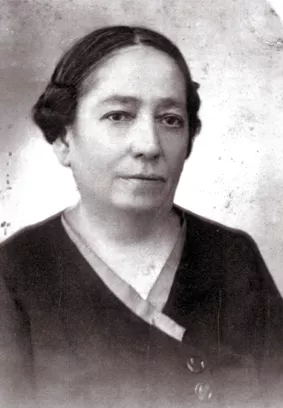Gita Seviov
This is my maternal grandmother Gita Seviov. The picture was made in Tallinn in 1940 when the family moved there. Mother asked grandmother to have her picture made for our family album. This is a copy. The original is in the museum of Narva Jewish community.
I do not know much about mother's family. My maternal grandmother's name is Gita, nee Garus. Her father's name was Saul Garus in grandmother's words, but in her birth record, which was lost during WW2, his name was Saveliy. Thus, I do not know what his name really was. Great grandfather had served in the tsarist army for 25 years. During Crimean war he was awarded with St. George Cross and was given honorary title " Hero of Sevastopol". I cannot tell for sure how many St. George Crosses great grandfather had, either 3 or 4. There was a law in tsarist Russia, according to which the cavaliers of St. George cross were granted land plots from the state. That rule worked for everybody, but Jews. Nevertheless, grandfather got the land. I do not know whether it was an award or offense as he was given the land without the right of entailment- he was not entitle to demise him or sell, but he had the right to use it. The land plot was in the remote place. The nearest house was three kilometers away. Besides, great grandfather was offered some position in the state,which was rare with the Jews. He was a light-keeper on Neva, in the vicinity of Ladoga lake. While great grandfather was working there, his family used that land. They had a cow and other husbandry. The family ate what they had grown.
There is little I know about Seviov. It is as pity. Grandfather, must have been a very good and unusual person. He was born in 1868 in the city of Gdov, Pskov, oblast, Russia, about [700 km from Moscow, close to Estonian border]. Grandfather was a tailor. He moved to Narva from Gdov. I do not know how grandparents met. Probably it was a prearranged marriage. When they got married, grandmother moved to Narva. Grandmother, as most of the married Jewish women was a homemaker,. She gave birth to children, raised them and took care of the house. Grandparents did not have their own house. The rented the 2nd floor of the loghouse from one Estonian man. The first floor of the house was occupied by the landlord and his family. There were 7 children in the family. The eldest son was Isaac, then was daughter Esfir was born on, the third was my future mother Rebecca, born on 1 February 1906. At the end of 1907 son Lazar was born in son and in couple of years another son, Mulya, and then another one, Abram. The last child was daughter Ida. All children got religious education.
Grandfather was very religious. Narva Jew respected him, listened to his words, though he was a simple man. He was considered almost a saint. He kept the door open for people and almost anybody could come to him for a support. In 1920 grandfather Iosif Seviov died. Nobody helped the orphaned family. Grandmother remained by herself with five children. She did not have any profession, and she started working as a seamstress. There was not enough money and soon family turned into very poor. The family starved, had no money for the rent. They had lived for three years without paying for the rent. The Estonian landlord helped them a lot. He had not asked them to pay for accommodation. The eldest sister Esfir was the first to leave for Tallinn. Soon the whole family went there. Children started working and save money. One day they came in Narva and paid off the debt to the landlord. He told them: "Children took after their father".
















